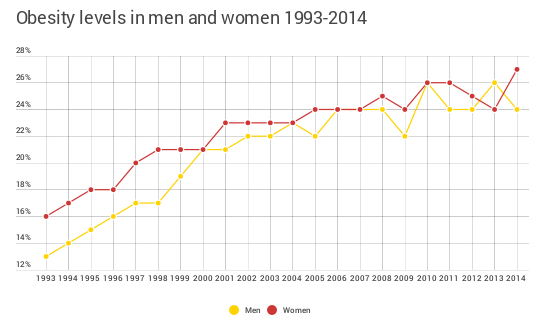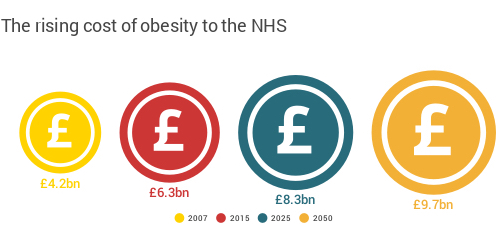Trend update: The obesity time bomb waiting to hit the workplace
A government report published in February this year found that nearly one in four adults in England are obese, while a further 36% are overweight.
In fact, over the last two decades the proportion of obese adults has climbed by almost 12 percentage points to 24.8% in 2014, up from just 13% in 1994.

When comparing the sexes, men are more likely to be overweight than women, with 65% of males classed as overweight or obese in 2014, compared to 58% of women, although 27% of women are considered to be obese, compared to 24% of men.
For the UK as a whole, the proportion of adults currently classed as obese stands at 24%.
But what does this ticking fat-time bomb mean for British businesses?
A 2007 report, Tacking Obesities: Future choices, estimated that the cost of the obesity epidemic to the NHS was £4.2bn in 2007, rising to £9.7 billion in 2050. But this only reflects the costs faced by the health service and not the wider economic impact on businesses.

The most recent Health Survey for England, which looked at data from 2014, found that almost half (46%) of obese adults were suffering from a longstanding illness, compared to just 33% of those who were normal weight.
For businesses, a prevalence of overweight staff can mean increased staff absences as a result of these associated health complaints, including coronary heart disease and stroke, resulting in reduced productivity and increasing insurance premiums.
Public Health England has estimated that for a company employing 1,000 people, this drop in productivity alone could cost as much as £126,000 every year.
And the real bad news for businesses is that the situation does not seem like it is going to get any better.
According to the National Child Measurement Programme, 9% of children are already obese by their first year of primary school (ages four to five) with a further 13% overweight.
By the time these kids reach 11 and are about to start secondary school, a whopping 19% have hit obesity and 14% are overweight – a super-sized problem indeed for the next generation of managers having to deal with increasing numbers of obese youngsters hitting the workforce and acting as a drain on productivity and finances.
This article was written by Matt Scott, REBA's tame actuary.

He safeguards the reward community from hours of online research, his superstrength is delivering the numerical proof you need to make your reward business case.






